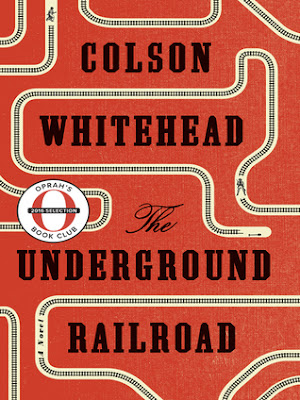 |
| Amazon |
 |
The music stopped. The circle broke. Sometimes a slave will be lost in a brief eddy of liberation. In the sway of a sudden reverie among the furrows or while untangling the mysteries of an early-morning dream. In the middle of a song on a warm Sunday night. Then it comes, always—the overseer’s cry, the call to work, the shadow of the master, the reminder that she is only a human being for a tiny moment across the eternity of her servitude."
"The Underground Railroad" had me by its awards: Winner of the Pulitzer Prize and the National Book Award. But then there was this: Winner of the Arthur C Clarke award for Science Fiction. Say what???
Grade: B+
While I wouldn't say this novel belongs on the Science Fiction shelf, it isn't completely comfortable on the historical fiction shelf, either. After all, the Underground Railroad in this novel is not a metaphor. It's a real, literal railroad, with tunnels and tracks and trains and conductors and stations. And although the story is about a runaway slave named Cora, the time period of the novel is hard to pin down as well. Cora has to deal with slavery, of course, so it's pre-Civil War, but Cora also has to deal with eugenics and syphilis experiments, horrors from the early 20th century. At one stop after another, Cora faces a new kind of danger right out of American history. "The Underground Railroad" reads a little like Odysseus's or Gulliver's travels. This novel might belong on the shelf with historical fantasy or magical realism, except for the fact that slavery and the malignant scar it left on the American spirit are real, not fantasy, not science fiction.
The description of slavery on the Randall plantation in Georgia where Cora's family has been enslaved for three generations is raw. "Stolen bodies working stolen land. It was an engine that did not stop, its hungry boiler fed with blood." Getting off the plantation is only the beginning of Cora's troubles and she knows it. Yet Cora, against all odds, decides to run, without knowing where she was running to, despite knowing that capture, torture and death were the most likely results of her decision.
What I learned about the Underground Railroad from school in the North was that it was the route to freedom and independence and opportunity. But Cora's journey after she runs off from the Georgia plantation is less a journey to freedom and more a series of horrors, each as bad as the last. Cora learns, "As if in the world there were no places to escape to, only places to flee." Once, trapped and hiding in an attic along the Underground Railroad, unable to leave for fear of capture, Cora considers her fate:
Read "The Underground Railroad." On one level, it's a gripping adventure. On another, it lays bare a wound that never heals, America's original sin.What a world it is, Cora thought, that makes a living prison into your only haven. Was she out of bondage or in its web: how to describe the status of a runaway? Freedom was a thing that shifted as you looked at it, the way a forest is dense with trees up close but from outside, from the empty meadow, you see its true limits.
Source: The Underground Railroad.
"The Underground Railroad" is available in Kindle format from the Richardson Public Library. :-)

No comments:
Post a Comment